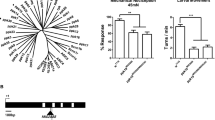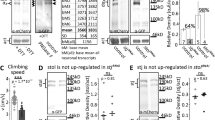Abstract
Previous research in Drosophila has implied that a variety of mutations affect ion channels1–4. In one of these studies it was suggested that mutations mapping at the X-linked Shaker locus of D. melanogaster might cause defects in some type of potassium channel in larval motoneurones2. We show here, by voltage-clamp analysis, that mutations at the Shaker locus affect one of the two types of voltage-sensitive potassium channels present in the Drosophila dorsal longitudinal flight muscle (DLM). Initial voltage-clamp studies5,6 revealed that one set of channels carries a fast, transient outward current, similar to the molluscan A current7–9, that is altered by mutations at the Shaker locus. The other set of channels carries a slower activating current, similar to delayed rectification10,11, that is not affected by the Shaker mutation.
This is a preview of subscription content, access via your institution
Access options
Subscribe to this journal
Receive 51 print issues and online access
$199.00 per year
only $3.90 per issue
Buy this article
- Purchase on Springer Link
- Instant access to full article PDF
Prices may be subject to local taxes which are calculated during checkout
Similar content being viewed by others
References
Kelly, L. E. Nature 248, 166–168 (1974).
Jan, Y. N., Jan, L. Y. & Dennis, M. J. Proc. R. Soc. B198, 87–108 (1977).
Wu, C.-F., Ganetzky, B., Jan, L. Y., Jan, Y.-N. & Benzer, S. Proc. natn. Acad. Sci. U.S.A. 75, 4047–4051 (1978).
Wu, C.-F. & Ganetzky, B. Nature 286, 814–816 (1980).
Salkoff, L. & Wyman, R. Proc. natn. Acad. Sci. U.S.A. 77, 6216–6220 (1980).
Salkoff, L. & Wyman, R. Science 212, 461–463 (1981).
Hagiwara, S., Kusano, K. & Saito, N. J. Physiol., Lond. 155, 470–489 (1961).
Connor, J. A. & Stevens, C. F. J. Physiol., Lond. 213, 21–30 (1971).
Neher, E. J. gen. Physiol. 58, 36–53 (1971).
Hodgkin, A. L. & Huxley, A. F. J. Physiol., Lond. 116, 473–496 (1952).
Aldrich, R. W., Getting, P. A. & Thompson, S. H. J. Physiol., Lond. 291, 507–530 (1979).
Pasternak, M. & Kaplan, W. D. Drosoph. Inf. Serv. 43, 62 (1968).
Thompson, S. H. J. Physiol., Lond. 265, 465–488 (1977).
Yeh, J. Z., Oxford, G. S., Wu, C. H. & Narahashi, T. Biophys. J. 16, 77–81 (1976).
Schauf, C. L., Colton, C. A., Colton, J. S. & Davis, F. A. J. Pharmac. exp. Ther. 197, 414–425 (1976).
Tanouye, M. A., Ferrus, A. & Fujita, S. C. Proc. natn. Acad. Sci. U.S.A. (in the press).
Author information
Authors and Affiliations
Rights and permissions
About this article
Cite this article
Salkoff, L., Wyman, R. Genetic modification of potassium channels in Drosophila Shaker mutants. Nature 293, 228–230 (1981). https://doi.org/10.1038/293228a0
Received:
Accepted:
Issue Date:
DOI: https://doi.org/10.1038/293228a0
This article is cited by
-
Regulatory Effect of General Anesthetics on Activity of Potassium Channels
Neuroscience Bulletin (2018)
-
The Genetics of Common Epilepsy Disorders: Lessons Learned from the Channelopathy Era
Current Genetic Medicine Reports (2014)
-
The history of TRP channels, a commentary and reflection
Pflügers Archiv - European Journal of Physiology (2011)
-
Using FlyAtlas to identify better Drosophila melanogaster models of human disease
Nature Genetics (2007)
-
Kinematic Analysis of Drosophila Larval Locomotion in Response to Intermittent Light Pulses
Behavior Genetics (2007)
Comments
By submitting a comment you agree to abide by our Terms and Community Guidelines. If you find something abusive or that does not comply with our terms or guidelines please flag it as inappropriate.



